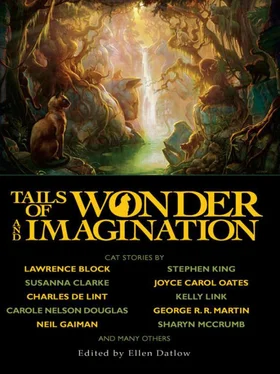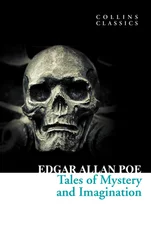Ellen Datlow - Tails of Wonder and Imagination
Здесь есть возможность читать онлайн «Ellen Datlow - Tails of Wonder and Imagination» весь текст электронной книги совершенно бесплатно (целиком полную версию без сокращений). В некоторых случаях можно слушать аудио, скачать через торрент в формате fb2 и присутствует краткое содержание. Год выпуска: 2010, ISBN: 2010, Издательство: Night Shade Books, Жанр: Фэнтези, Фантастика и фэнтези, Ужасы и Мистика, на английском языке. Описание произведения, (предисловие) а так же отзывы посетителей доступны на портале библиотеки ЛибКат.
- Название:Tails of Wonder and Imagination
- Автор:
- Издательство:Night Shade Books
- Жанр:
- Год:2010
- ISBN:978-1-59780-170-6
- Рейтинг книги:5 / 5. Голосов: 1
-
Избранное:Добавить в избранное
- Отзывы:
-
Ваша оценка:
- 100
- 1
- 2
- 3
- 4
- 5
Tails of Wonder and Imagination: краткое содержание, описание и аннотация
Предлагаем к чтению аннотацию, описание, краткое содержание или предисловие (зависит от того, что написал сам автор книги «Tails of Wonder and Imagination»). Если вы не нашли необходимую информацию о книге — напишите в комментариях, мы постараемся отыскать её.
collects the best of the last thirty years of science fiction and fantasy stories about cats from an all-star list of contributors.
Tails of Wonder and Imagination — читать онлайн бесплатно полную книгу (весь текст) целиком
Ниже представлен текст книги, разбитый по страницам. Система сохранения места последней прочитанной страницы, позволяет с удобством читать онлайн бесплатно книгу «Tails of Wonder and Imagination», без необходимости каждый раз заново искать на чём Вы остановились. Поставьте закладку, и сможете в любой момент перейти на страницу, на которой закончили чтение.
Интервал:
Закладка:
But as he thought this, Esteban suddenly realized that killing the jaguar might be the solution to his problems, that by going against his father’s teaching, that by killing his dreams, his Indian conception of the world, he might be able to find accord with his wife’s; he had been standing halfway between the two conceptions for too long, and it was time for him to choose. And there was no real choice. It was this world he inhabited, not that of the jaguars; if it took the death of a magical creature to permit him to embrace as joys the television and trips to the movies and a stucco house in Barrio Clarín, well, he had faith in this method. He swung the machete, slicing the dark air, and laughed. Incarnación’s frivolousness, his skill at hunting, Onofrio’s greed, the jaguar, the television… all these things were neatly woven together like the elements of a spell, one whose products would be a denial of magic and a furthering of the unmagical doctrines that had corrupted Puerto Morada. He laughed again, but a second later he chided himself: It was exactly this sort of thinking he was preparing to root out.
Esteban waked Incarnación early the next morning and forced her to accompany him to the appliance store. His machete swung by his side in a leather sheath, and he carried a burlap sack containing food and the herbs he would need for the hunt. Incarnación trotted along beside him, silent, her face hidden by a shawl. When they reached the store, Esteban had Onofrio stamp the bill PAID IN FULL, then he handed the bill and the money to Incarnación.
“If I kill the jaguar or if it kills me,” he said harshly, “this will be yours. Should I fail to return within a week, you may assume that I will never return.”
She retreated a step, her face registering alarm, as if she had seen him in a new light and understood the consequences of her actions; but she made no move to stop him as he walked out the door.
Across the street, Raimundo Esteves was leaning against the wall of the Cantina Atómica, talking to two girls wearing jeans and frilly blouses; the girls were fluttering their hands and dancing to the music that issued from the cantina, and to Esteban they seemed more alien than the creature he was to hunt. Raimundo spotted him and whispered to the girls; they peeked over their shoulders and laughed. Already angry at Incarnación, Esteban was washed over by a cold fury. He crossed the street to them, rested his hand on the hilt of the machete, and stared at Raimundo; he had never before noticed how soft he was, how empty of presence. A crop of pimples straggled along his jaw, the flesh beneath his eyes was pocked by tiny indentations like those made by a silversmith’s hammer, and, unequal to the stare, his eyes darted back and forth between the two girls.
Esteban’s anger dissolved into revulsion. “I am Esteban Caax,” he said. “I have built my own house, tilled my soil, and brought four children into the world. This day I am going to hunt the jaguar of Barrio Carolina in order to make you and your father even fatter than you are.” He ran his gaze up and down Raimundo’s body, and, letting his voice fill with disgust, he asked, “Who are you?”
Raimundo’s puffy face cinched in a knot of hatred, but he offered no response. The girls tittered and skipped through the door of the cantina; Esteban could hear them describing the incident, laughter, and he continued to stare at Raimundo. Several other girls poked their heads out the door, giggling and whispering. After a moment Esteban spun on his heel and walked away. Behind him there was a chorus of unrestrained laughter, and a girl’s voice called mockingly, “Raimundo! Who are you?” Other voices joined in, and it soon became a chant.
Barrio Carolina was not truly a barrio of Puerto Morada; it lay beyond Punta Manabique, the southernmost enclosure of the bay, and was fronted by a palm hammock and the loveliest stretch of beach in all the province, a curving slice of white sand giving way to jade-green shallows. Forty years before, it had been the headquarters of the fruit company’s experimental farm, a project of such vast scope that a small town had been built on the site: rows of white frame houses with shingle roofs and screen porches, the kind you might see in a magazine illustration of rural America. The company had touted the project as being the keystone of the country’s future and had promised to develop high-yield crops that would banish starvation; but in 1947 a cholera epidemic had ravaged the coast, and the town had been abandoned. By the time the cholera scare had died down, the company had become well entrenched in national politics and no longer needed to maintain a benevolent image; the project had been dropped and the property abandoned until—in the same year that Esteban had retired from hunting—developers had bought it, planning to build a major resort. It was then the jaguar had appeared. Though it had not killed any of the workmen, it had terrorized them to the point that they had refused to begin the job. Hunters had been sent, and these the jaguar had killed. The last party of hunters had been equipped with automatic rifles, all manner of technological aids; but the jaguar had picked them off one by one, and this project, too, had been abandoned. Rumor had it that the land had recently been resold (now Esteban knew to whom), and that the idea of a resort was once more under consideration.
The walk from Puerto Morada was hot and tiring, and upon arrival Esteban sat beneath a palm and ate a lunch of cold banana fritters. Combers as white as toothpaste broke on the shore, and there was no human litter, just dead fronds and driftwood and coconuts. All but four of the houses had been swallowed by the jungle, and only sections of those four remained visible, embedded like moldering gates in a blackish green wall of vegetation. Even under the bright sunlight, they were haunted looking: their screens ripped, boards weathered gray, vines cascading over their façades. A mango tree had sprouted from one of the porches, and wild parrots were eating its fruit. He had not visited the barrio since childhood; the ruins had frightened him then, but now he found them appealing, testifying to the dominion of natural law. It distressed him that he would help transform it all into a place where the parrots would be chained to perches and the jaguars would be designs on tablecloths, a place of swimming pools and tourists sipping from coconut shells. Nonetheless, after he had finished lunch, he set out to explore the jungle and soon discovered a trail used by the jaguar: a narrow path that wound between the vine-matted shells of the houses for about a half mile and ended at the Rio Dulce. The river was a murkier green than the sea, curving away through the jungle walls; the jaguar’s tracks were everywhere along the bank, especially thick upon a tussocky rise some five or six feet above the water. This baffled Esteban. The jaguar could not drink from the rise, and it certainly would not sleep there. He puzzled over it awhile, but eventually shrugged it off, returned to the beach, and, because he planned to keep watch that night, took a nap beneath the palms.
Some hours later, around midafternoon, he was started from his nap by a voice hailing him. A tall, slim, copper-skinned woman was walking toward him, wearing a dress of dark green—almost the exact color of the jungle walls—that exposed the swell of her breasts. As she drew near, he saw that though her features had a Patucan cast, they were of a lapidary fineness uncommon to the tribe; it was as if they had been refined into a lovely mask: cheeks planed into subtle hollows, lips sculpted full, stylized feathers of ebony inlaid for eyebrows, eyes of jet and white onyx, and all this given a human gloss. A sheen of sweat covered her breasts, and a single curl of black hair lay over her collarbone, so artful-seeming it appeared to have been placed there by design. She knelt beside him, gazing at him impassively, and Esteban was flustered by her heated air of sensuality. The sea breeze bore her scent to him, a sweet musk that reminded him of mangoes left ripening in the sun.
Читать дальшеИнтервал:
Закладка:
Похожие книги на «Tails of Wonder and Imagination»
Представляем Вашему вниманию похожие книги на «Tails of Wonder and Imagination» списком для выбора. Мы отобрали схожую по названию и смыслу литературу в надежде предоставить читателям больше вариантов отыскать новые, интересные, ещё непрочитанные произведения.
Обсуждение, отзывы о книге «Tails of Wonder and Imagination» и просто собственные мнения читателей. Оставьте ваши комментарии, напишите, что Вы думаете о произведении, его смысле или главных героях. Укажите что конкретно понравилось, а что нет, и почему Вы так считаете.












